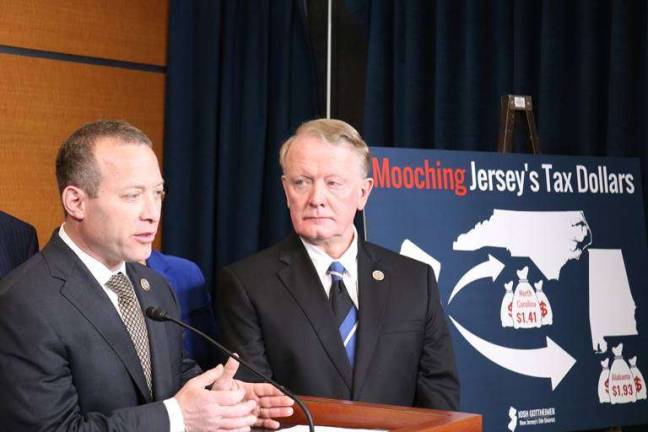Gottheimer, bipartisan NJ delegation slam ‘moocher states’ over Gateway Program

TRENTON — Members of New Jersey’s bipartisan delegation gathered in Washington, D.C., to slam the 27 members from “moocher states” who signed a letter calling for cuts in funding for the Gateway Program.
While New Jersey historically has received only .74 for every federal tax dollar paid, North Carolina—where the letter originated—receives $1.41 in federal spending for every dollar paid. The most recent figures show it received $105.1 billion in federal outlays while sending $62,478 billion in federal receipts.
“They’re not satisfied with the fact that every year, my district only gets back 33 cents for every dollar we send to Washington, and New Jersey only 74 cents on the dollar.” said Congressman Josh Gottheimer (D-5). “In fact, these ‘moocher states’ like North Carolina and Alabama are so greedy that they are now trying to upend the bipartisan appropriations omnibus that we just agreed to a month ago. I’m for tax cuts, but these ‘moochers states’ are now trying to rescind, or take back, the investment that’s being made for the Gateway Program, America’s most critical infrastructure need today, that would add tunnels and capacity underneath the Hudson River. Tunnels that are literally crumbling. Don’t take more than you put in. Let’s take that money and put it in New Jersey; let’s build this tunnel between New York and New Jersey.”
The Tax Hike Bill passed by Congress in December gutted the State and Local Tax Deduction (SALT), causing about a 7-percentage-point tax increase on many of the taxpayers in the Fifth District, making families and businesses less likely to come to New Jersey and more likely to leave.
In October, Gottheimer and Leonard Lance (R-7) announced the “Anti-Moocher Bill” they are cosponsoring, officially known as the “Return on Investment Accountability Act.” The bill would address the disparity in federal spending among states by giving refundable tax credits to eligible recipients whose states get less funding from the federal government than the taxes they pay in aggregate.